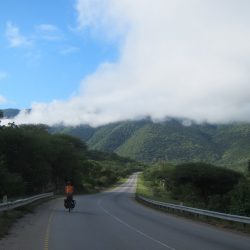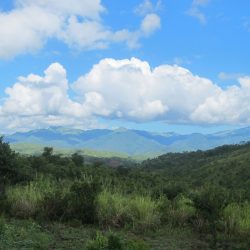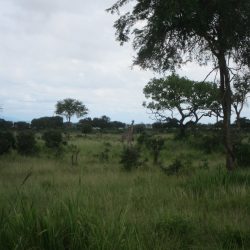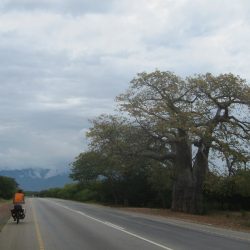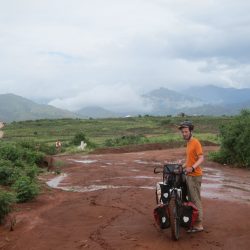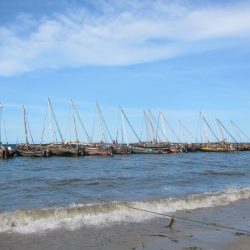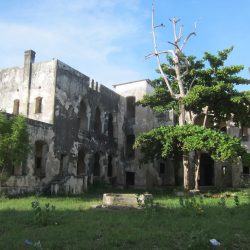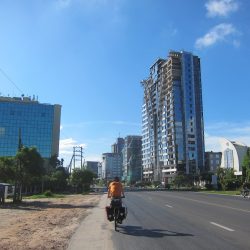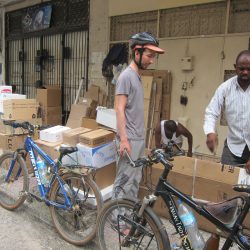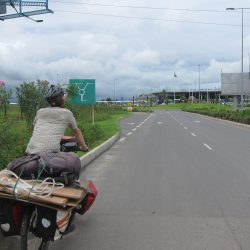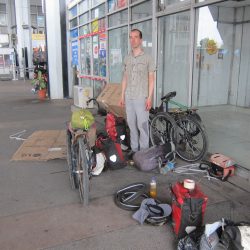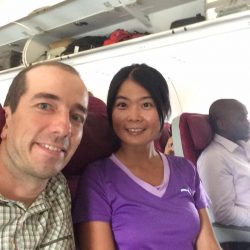We have come to love Tanzania and have been looking forward to spending more time in this country and the rest of Africa. But an unfortunate twist forced us to abruptly change our plans.
The rejection
After crossing the Mtera dam at the lowest point of the plain, we slowly and leisurely made our way up to the highlands. The climb led through a completely unpopulated landscape full of bush and wild camping was easily possible – it may sound strange, but this was the first time in Africa where we were sure that no one would come to visit us during camping. Finally, we arrived back in highland villages and checked Yuily’s emails. One of them had in the subject “Your visa application was rejected”.
What? How can that be? We had exactly the same application with the same documents. We guessed it: The only difference in our application is of course the nationality. It was infuriating, an obvious racist decision – I’ve heard that Zambia has been experiencing difficulties with Chinese investment since a few months. And of course, the official name “Republic of China” still shines on a Taiwanese passport. Not that it makes a big difference anyway: As we hear daily with all the “China” calls, people with East Asian looks are all Chinese for most Africans anyway. Why should this be different for immigration authorities? That was a big blow. We cycled on to Iringa, deep in thought, what we can do now. Could we appeal? Choose an alternative route? Temporarily separate? It was a very strange feeling.
Arriving in Iringa, welcomed by our Couchsurfing host Johnny, we did some research and were in constant contact with a Zambian official whose contact we had from another cyclist. Although she works with immigration, she has little to do with tourist visas. It turned out that no appeal is possible, but they can refrain from the conditions for a renewed application. It also meant paying again, which we did not want. However, the alternatives did not sound good: in order to avoid Zambia on the way to Namibia, we would have to go through Malawi, Mozambique, Zimbabwe and Botswana. Four visas instead of one, each of which could theoretically be rejected. In addition, the region has just been hit by devastating floods, which could be another obstacle.
The other option was a temporary break. Yuily already had some travel fatigue and homesickness (especially for Taiwanese food) anyway, and she saw this rejection as a sign that it might be time to stop. I have not felt that way so far, and especially in Tanzania I enjoyed this Africa trip. Yuily said relatively quickly that she would agree to a temporary separation as I continue to cycle through Africa. I also thought about this option in the beginning, we split up because of visa problems before, in China and Kazakhstan respectively after all. But the more I thought about it, the less I could agree to it. This separation would take up to 6 months, possibly even longer. We started this journey together, so we end it together.
After initial emotional discussions, we slept the night over this decision. For me, the only way out came: a second application. Yuily came to the same conclusion after the night. What we both still wanted most was to continue this journey, and this continuation led through Zambia. We do not like lotteries and a second application seemed to be a justification for this behavior of the Zambian authorities after this humiliating refusal. My mother put it in a nutshell: It’s as if a hotel owner says, “You can stay, but your wife can not. We do not like Asians”. The only right thing would be to turn our back on such a business. But the thought that the journey was over now devastated me. I thought we should try this second application because only another rejection would allow me to fly home with a clear conscience.
So we sent out a second application with much more supporting documents and paid it. We also said goodbye to our host Johnny and took us a guest house in the city – he was a great host, but we did not want to burden him with our desperation. So in Iringa a waiting game for the answer began, because with a renewed rejection we would have to cycle in the other direction to the airport Dar es Salaam.
It took a while, we had to wait almost a week in Iringa to get an answer to the second application. Although the guest house was great and cheap, there was plenty of food on sale nearby and we usually enjoyed such a time, every day was grueling. We checked Yuily’s emails several times a day for an answer. Of course, we hoped for a positive response, but as the days went by, I even thought that a negative answer would be fine as we would at least know what to do. Finally, after six days an e-mail arrived: “Your visa application was … rejected”.
Fuck. It was now clear: Zambia did not want to let Yuily enter because of racist reasons and it will be impossible to cycle in this country. We cursed for a while, but I also felt some relief: At least the grueling wait is over now and we know what to do. We had searched the days for flights and found a number of affordable flights from Dar es Salaam to Europe. The prices were very stable, so we did not book anything and made our way first. To turn left after Iringa to Dar es Salaam, instead of turning right to Mbeya and Zambia, was very painful and our anger at the Zambian authorities was coming up again.
Good last experiences
But we quickly saw the positive side of this forced decision, because the landscape on this route was very beautiful. On the first day we reached the escarpment, where we went downhill from 1700 meters to 500 meters altitude. The road hung for several dozen kilometers on a rainforest-covered cliff, went into a canyon and followed a river, while on the left and right of us were more mountains. After leaving the highlands, we expected a brutal heat, but it stayed away from us as we had several cloudy days.
On the way we got to see a tourist attraction that would otherwise be too far away: the Mikumi National Park. As in the parks Tsavo in Kenya and Queen Elizabeth in Uganda, the main road led through the park and as long as you do not turn off, you do not have to pay the horrendous entrance fees. So we saw again several antelopes and giraffes. A nice farewell gift from Africa.
- Going down through…
- … beautiful Mountains
- Giraffe in Mikumi
- Baobab tree
Arriving in the city of Morogoro, we also booked our flight. We decided to fly to Madrid in Spain instead of immediately to Germany. The tickets were the cheapest, so we had a little last adventure ahead of us, where we would cycle home from Spain through France and Switzerland. This will also be a nice end, as we had planned to fly from Madrid to Africa anyway, before we had found the cheap Brussels-Mombasa flight. €350 for the fun with change in Qatar. Thanks to the generous free baggage allowance of Qatar Airways (45 kg without size or quantity limit), the transport of the bicycles was also free of charge.
Out of Morogoro I took a shortcut that ended in the mud, through which we had to pull our bicycles to get back to the paved road. Mud in East Africa is absolutely disgusting. It sticks to everything, but is slippery and soft. It stuck to our chains and brakes and when it hardened, we literally had to chisel it away. Many roads in Africa become impassable in the rainy season because of this mud that forms from the clay-rich soils. We wanted to make a short detour to the coastal city of Bagamoyo before Dar es Salaam – thanks to this experience, it was easy to decide to take the longer but paved road there.
Bagamoyo was a nice last attraction for us. A friendly elderly gentleman near Iringa had made us aware of this city and it was well worth the detour. German colonialists had used this fishing town as the first base to subjugate the rest of Tanzania. Many buildings, which are currently in various stages of decay, testify to the former German settlement, as well as the narrow, cobbled streets. A nice piece of history. In Germany we often learn of the negative effects of colonisation, but many Tanzanians have a more positive image. “We got inspired by your school system (the Swahili word for school is ‘Shule’), and look at the railways: built 120 years ago and they still work!”a Tanzanian once told me.
- Through the mud
- Indian Ocean!
- Colonial buildings
- Dar es Salaam
Bye bye, Africa
Finally, we rolled the last few miles into Dar es Salaam. As so often in countries with large differences between poor and rich, this city was a different world from the rest of the country. Shiny skyscrapers, men in neat suits and luxury cars on the street. We thought so when we saw poverty in Tanzania, but could not reconcile it with the country’s moderately stable GDP. I hope there will be more wealth distribution in the future. We made our way to our hostess Elaine, an Irish woman who has been living in Tanzania for over 10 years, not in a sheltered expat zone, but in a self-built house in a native suburb. Two Swiss cyclists were already there and a German cyclist came to visit in the evening and we had a great time.
We had four days to prepare for the flight. As nice as it was with Elaine, the humid climate bothered us. Our skin was sticky with all the sweat and countless mosquitoes stung us all the time. In addition, bed bug bites appeared on our skin, probably from our guesthouse in Bagamoyo. We went in search of packing material. Bike boxes were impossible to find, but after some hints we found a street corner in the city where old boxes were sold. Two boxes of a large air conditioner were after a few changes suitable for our bicycles and about 5.50 € changed satisfied hands.
The time finally came and we cycled to the airport, packed our bikes in front of the terminal and checked in. I was still cursing at the Zambian authorities, but that was the end of our Africa tour. The air conditioned flight felt great compared to the sweltering heat we were last exposed to, but we were saddened to leave the continent. Safari Njema!
- Buying boxes
- To the airport
- Packing the bikes
- On the flight
Final impressions of Tanzania and East Africa
Tanzania was a great country that we liked very much. Similar to Kenya, people were very hospitable and cycling was very pleasant. We were hardly begged at or harassed, which could also have something to do with the language barrier. English is a foreign language for most Tanzanians and communication was similarly difficult as in other countries where we do not know the language, such as France or Iran. Even so, many people were very helpful and someone who spoke English was quickly found in many situations. Accommodation and food was always easy and cheap to find, and while we will not miss the food (rice with beans was often the only meal), the value of accommodation was unbeatable. In all but the smallest places there was at least one guest house, clean and pleasant, often under 4 € per room. With rising prices, the comfort went up and hotels in the 10-20 € category were often really luxurious.
Of the four countries we visited, Kenya and Tanzania were my clear favorites. In both countries, people were very generous and hospitable, cycling pleasant in general and the scenery was great. The infrastructure was simple, but everywhere sufficiently available, so we never had to worry about food, water or accommodation. Kenya, in particular, had incredibly varied landscapes and the people spoke very good English. Uganda and Rwanda were more challenging as some people begged and behaved disrespectfully. Nevertheless, we have also had mostly positive experiences in these countries.
It’s amazing how little we know about Africa in Europe or Asia. News about Africa is mostly about hunger, poverty and war. Although a lot of tourists visit East Africa, most of them are driven directly from the airport to safari lodges and never come into contact with people. So we know very little about the way of life of people in these countries. This ignorance also leads to aid projects being often counterproductive and only increasing poverty. I can absolutely recommend a bike trip here. In no other part of the world have I felt so foreign and learned so much every day. The challenges and difficulties that come with cycle touring in Africa are worth it for the incredible experience you get here. Just as with traveling in other parts of the world, 99.99% of people are kindhearted and the best way to meet them is from the saddle of a bicycle.
